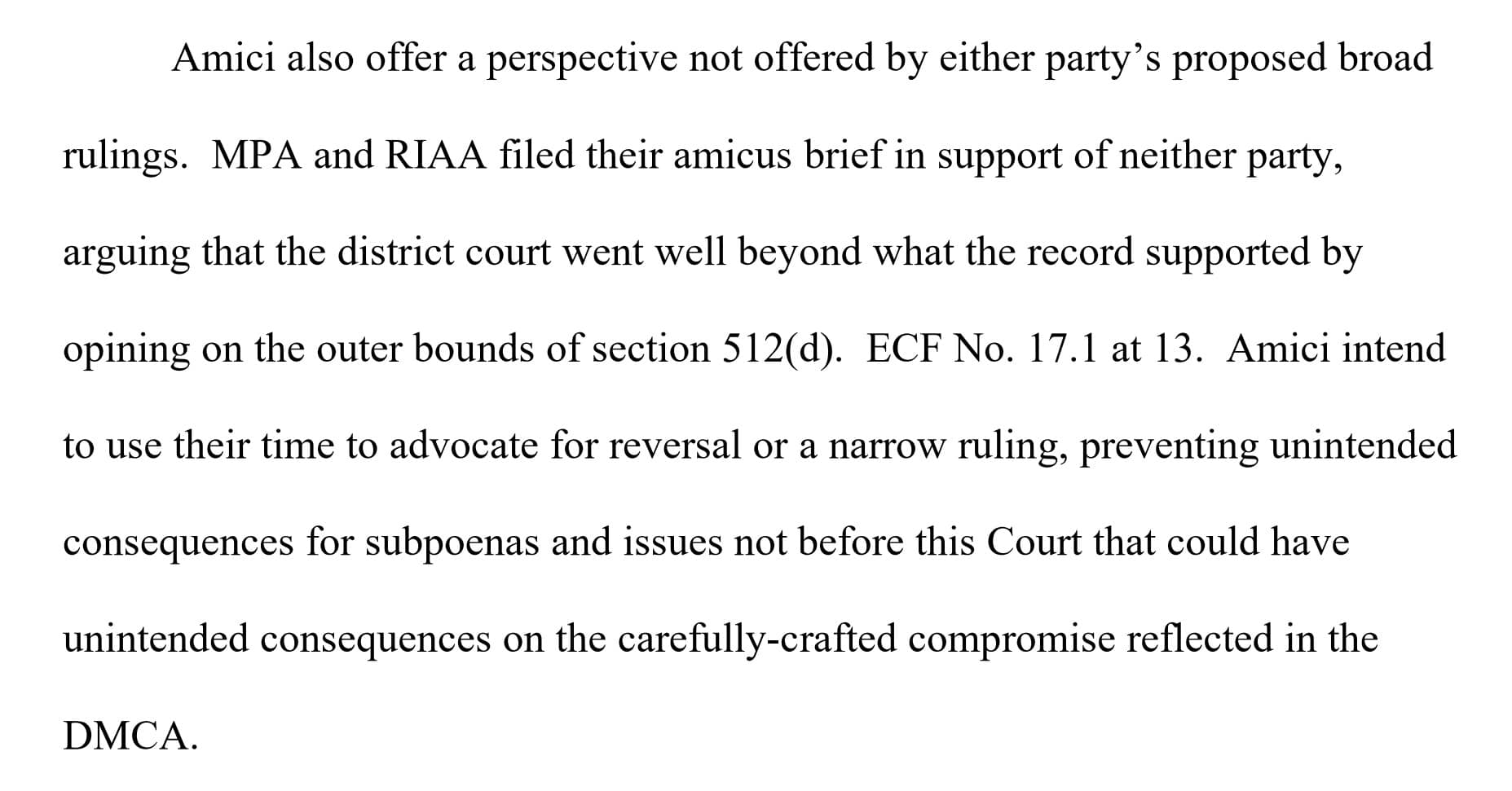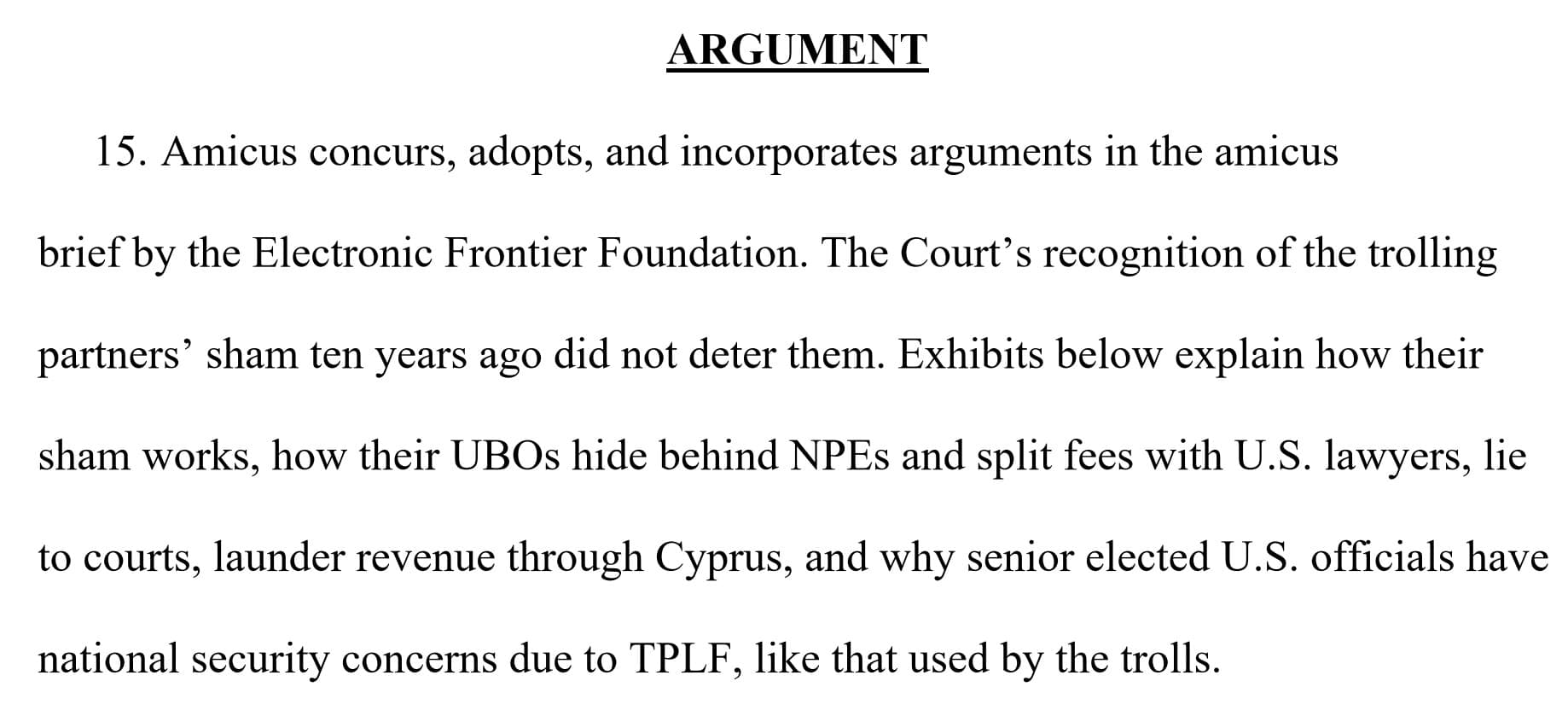Tackling online piracy is a complicated endeavor that often begins with efforts to identify the operators of infringing sites and services. This is also where the first hurdles show up.
Many pirates keep their identities concealed. This applies to the operators of sites and services as well as their users.
This relative anonymity is a nuisance to anti-piracy groups, including the RIAA and MPA. While most online services refuse to voluntarily hand over user details, legal tools can help rightsholders move forward.
In recent years, DMCA subpoenas have established themselves as a key anti-piracy enforcement tool. These requests don’t require any oversight from a judge and are typically signed off by a court clerk. This makes them ideal to swiftly identify online pirates.
DMCA Subpoenas at Risk
Both the RIAA and MPA have used these subpoenas to identify owners of pirate sites and individual infringers. The groups would like DMCA subpoenas, as detailed in DMCA §512(h), to remain in their toolbox but there are concerns that a recent court order could hinder their effectiveness.
The case in point doesn’t involve the RIAA or MPA. It’s a dispute between several independent film companies and Internet provider Cox. The latter successfully objected to a DMCA subpoena which sought to obtain the personal details of numerous alleged BitTorrent pirates.
The main contention in this case is whether DMCA subpoenas apply to residential Internet providers. Cox argued against, describing itself as a mere conduit provider benefiting from the DMCA’s §512(a) safe harbor, which does not require ISPs to take anything down, because the ISP doesn’t store content.
For background, a brief summary of the four types of ISPs under 17 U.S.C. § 512.
– §512(a): transitory digital network communications; services that merely pass on bits and bytes
– §512(b): system caching; services that temporarily store (cache) data
– §512(c): storage of information on systems; services that host data
– §512(d): information location tools; services that connect users to online locations (e.g. social media, search engines)
Last year, the court agreed with Cox’s reasoning and quashed the subpoena. The order concluded that DMCA subpoenas typically don’t apply to DMCA §512(a) services, but do apply to other providers that store or link to infringing content directly.
The film companies, including Capstone Studios and Millennium Funding, didn’t give up. After the motion for reconsideration failed, they filed an appeal at the Ninth Circuit Court of Appeals. Among other things, the appeal argued that Cox also falls under DMCA §512(d), as it can remove or disable ‘references or links’ to infringing content.
In addition, the rightsholders also argue that DMCA subpoenas apply to § 512(a) service providers. Therefore, they say, a DMCA subpoena should be valid for Cox.
MPA and RIAA Want to be Heard
The language of the DMCA can be complex at times and open to interpretation. The film companies hope that they can force a breakthrough via the court of appeals, but an adverse ruling that further restricts the scope of DMCA subpoenas is possible too.
The risk of an adverse ruling clearly has the MPA and RIAA worried. They often use these subpoenas to request information from third-party services such as Cloudflare, social media companies, and domain registrars.
The trade groups previously shared their thoughts in an amicus brief. They didn’t take sides in the dispute, but pointed out that the lower court’s ruling was too broad. Specifically, they questioned the part suggesting that IP addresses may never function as links, within the context of the section 512(d) safe harbor.
MPA and RIAA instead argued that section 512(d) services, which could cover reverse proxy providers such as Cloudflare, can link to pirate websites through IP-addresses.
If the district court’s order stands, the validity of MPA and RIAA DMCA subpoenas may be in question. For this reason, the group urged the court to limit its findings to the evidence at hand, without the contested and presumably unneeded IP-address interpretation.
To further reiterate this position, MPA and RIAA asked for speaking time at a hearing scheduled for June. They request 10 minutes of the court’s time, while keeping the available time for the other parties at 15 minutes each.
“MPA and RIAA invest substantial resources to combat online piracy, including through the use of section 512(h) subpoenas. Because infringers hide under aliases and behind proxies, section 512(h) subpoenas are a key tool to combat online infringement and protect the legitimate creative industries,” the groups inform the court.
“Amici intend to use their time to advocate for reversal or a narrow ruling, preventing unintended consequences for subpoenas and issues not before this Court that could have unintended consequences on the carefully-crafted compromise reflected in the DMCA.”

The court has yet to rule on this request. While the movie companies don’t object, Cox doesn’t want to extend the hearing by ten minutes, but wants the MPA and RIAA to use the film companies’ time instead.
‘Trolls’
Where the MPA and RIAA call for a more narrow and restricted ruling, an additional third-party has submitted an amicus brief that extends far beyond the legal intricacies of the DMCA’s section 512.
That submission comes from Charles Muszynski, who has been embroiled with movie companies and their attorneys for several years. Their dispute started when the movie companies targeted LiquidVPN, which had been purchased by one of Muszynski’s companies.
That particular legal battle is over, but follow-up litigation in international courts continues to this day. According to Muszynski, the movie companies are of a “copyright troll” group that operates a “criminal racketeering and money laundering sham” that he likens to the criminal Prenda Law operation.
These allegations are not immediately relevant for the DMCA subpoena argument. But, for the matter at hand, Muszynski’s amicus brief concurs and adopts the arguments that were previously made by the Electronic Frontier Foundation (EFF) in this case.

EFF also used the “troll” terminology, albeit in a different context and without directly referring to the movie companies. EFF urged the court not to allow copyright holders to issue §512(h) subpoenas to ISPs who simply transmit data, as this could trigger more coercive settlement requests against internet subscribers.
The amicus curiae briefs from both EFF and Muszynski are still listed as pending, so it’s still unknown whether they will be considered by the Court of Appeals. That said, with many eyes on this case, it’s clear that there’s a lot at stake in the upcoming hearing, and in the ruling that will eventually follow.
—
A copy of the MPA and RIAA’s request to participate in the oral hearing is available here (pdf). Muszynski’s amicus curiae brief is available here (pdf)
From: TF, for the latest news on copyright battles, piracy and more.
Source : MPA and RIAA Want to be Heard in Crucial DMCA Subpoena Appeal












